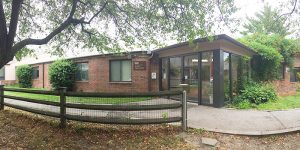Through crisp Fall air, I follow a line of sixteen children along a leaf-strewn trail. These children are dressed in waterproof rain pants and boots and are headed to a nearby pond. Along the trail, we visit the stream running behind our school. After a few rainy weeks, this stream is very full, culminating in a large, deep puddle. To everyone’s delight, this discovery led to an impromptu exploration of sink and float, as children started tossing in objects that they found along the trail. “I see it floating!” “I want to try with a walnut.” “It (a crab apple)floats!” “It went into the water! Kaploo!”
These children are part of a class of preschoolers at Drumlin Farm Community Preschool in Lincoln, MA [https://www.massaudubon.org/get-outdoors/wildlife-sanctuaries/drumlin-farm/programs-classes-activities/community-preschool], where I’ve been teaching for the past three years. This school is part of a growing movement of nature preschools across the country. Natural Start Alliance [https://naturalstart.org/], part of the North American Association for Environmental Education [https://naaee.org/], cites as their foundation the beliefs that “quality education for young children includes regular opportunities to connect with nature and the local environment… [and] that as children learn to care for themselves and others, they also begin to learn to care for the world around them.” Drumlin Farm is also part of the Mass Audubon network [https://www.massaudubon.org/], which includes nature-preschools as part of their strategic vision for connecting people to nature and advocating for environmental issues.

This stream is only a small part of the sanctuary that these children will explore over the course of the school year. The children also participate in farm life, with weekly chores in which they care for the animals on the farm. They help to grow and harvest fruits and vegetables, and we regularly bake and cook, using food produced right on the farm. This curriculum is created with a goal of giving children meaningful experiences with the natural world around them, as a growing body of research shows that people who have had positive experiences in nature as children go on to be advocates for the environment as adults.
As someone who cares deeply about the environment and worries about the world my own children are growing up in, this last point is a major reason why I feel passionate about the work that I do with my little band of preschoolers. I am not an engineer with the technological solutions to clean our air or stem the effects of climate change, but I can do my part with this group of muddy children. They are learning the things that preschoolers should learn – how to set goals, keep themselves safe, negotiate with their friends, and solve problems. We weave in all of the so-called “Kindergarten readiness” concepts into our curriculum as well – we play with concepts in reading, math, science, and social studies. But just as importantly, these children are learning to value the world outdoors, and may someday become grown-ups who fight for the environment as well.
For now, we focus our energy on this stream. We exclaim over how much it has grown or shrunk, we find things to toss into it or pull out of it, we marvel at the sound it makes or the way it smells. And then we move on down the trail, looking for more things that make us wonder.
Jessie Gildea Trowbridge earned her MA at Eliot-Pearson in 2007 and has been teaching at Mass Audubon’s Drumlin Farm Community Preschool for the past three years. She is also a trainer and course developer for Early Childhood Educators, providing trainings and workshops across the state.

 ABOUT
ABOUT